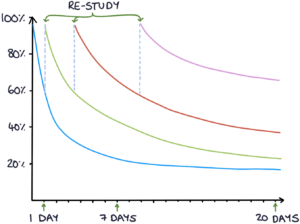The basis of memory is your brain making associations and recognising patterns. The more often these patterns are established, the stronger those associations and patterns become in your memory.
Over time these connections and associations will fade. With each repetition, these associations will be reinforced and become more permanent. The only way to retain information long term is by repeatedly learning it. The more repetitions you have, the longer you will remember the information and the stronger that memory will become.
This is illustrated by the forgetting curve. On the x-axis is the time since you studied a topic. On the y-axis is the amount of content you remember. The blue line represents the first time you studied the topic. Your memory of what you studied drops off very quickly. The light green line represents the second time you studied the topic. For this second repetition, your memory falls slower and you retain more information for longer. For the third and fourth repetitions, represented by the orange and pink lines, the amount you retain in your memory continues to improve.

Additionally, with each subsequent review, you will understand more, it will be more familiar to you and it will take you less time to study. Each repetition will become easier and more rewarding.
Although everybody knows this, it is amazing how few people make time and effort to repeatedly learn things. They do not effectively organise their time to ensure they are able to perform repetitions. They might spend an entire week going through cardiology in detail. As you can see from the forgetting curve, although they went into great detail, that knowledge is quickly lost. As they spend a week going through each speciality, by the time their exam arrives they do not have time to re-study cardiology, and only remember 20% or so of what they originally learned.
It would be better to cram their cardiology revision into a single day, and then come back to study it again several times before the exam. Although they would not be able to go into great detail the first time, that is ok, because they are going to forget most of what they read anyway. Covering each topic in a day or less means they will be able to learn that topic again several times before the exam. In fact, if you cover each topic in a day rather than a week, you could potentially repeat each topic 7 times more often.
I recommend spacing your repetitions over more time the more repetitions you do. For example, repeat the material a week after you first study it, then two weeks, then a month, then three months and so on. You don’t have to follow any set routine but it is vital to ensure you do repeatedly learn that information over time to solidify that memory.
